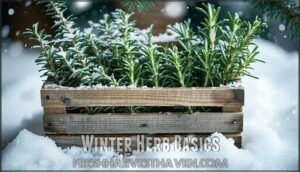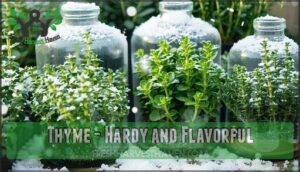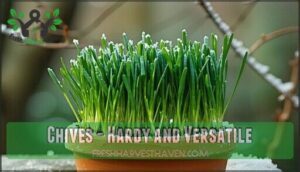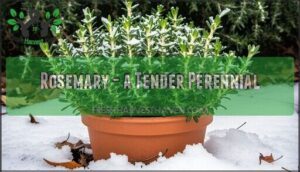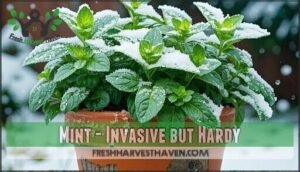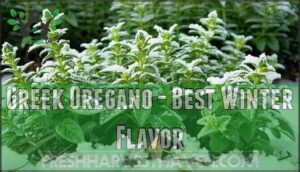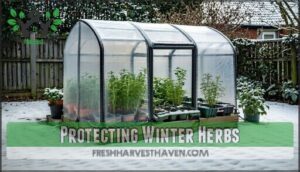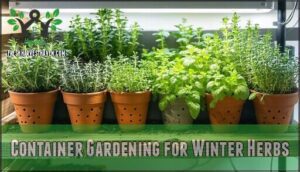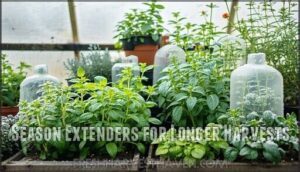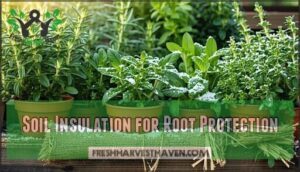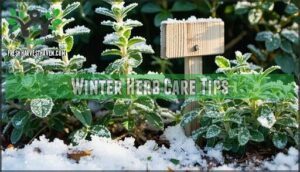This site is supported by our readers. We may earn a commission, at no cost to you, if you purchase through links.
 You’ll find several herbs that thrive during winter’s chill.
You’ll find several herbs that thrive during winter’s chill.
The best herbs to grow in winter include rosemary, thyme, sage, mint, and oregano—all fairly hardy in cooler temperatures.
Parsley and chives also perform well, offering fresh flavors when other plants have gone dormant.
For indoor growing, consider basil and cilantro near sunny windows.
Most winter herbs need at least 6 hours of sunlight daily and well-draining soil to prevent root rot.
Many perennial varieties will return year after year with minimal care, making them practical additions to your garden.
Proper protection methods can extend your harvest season well beyond what you might expect.
Table Of Contents
- Key Takeaways
- Winter Herb Basics
- Hardy Winter Herbs
- Protecting Winter Herbs
- Growing Winter Herbs
- Winter Herb Care Tips
- Frequently Asked Questions (FAQs)
- What is the best herb to grow in winter?
- What is the easiest plant to grow in winter?
- Can I grow herbs inside in winter?
- What herb comes back every year?
- What are the best winter herbs?
- Which herb is most tolerant of cold temperatures?
- Can an herb garden survive winter?
- Can I grow herbs in the fall?
- Can I grow herbs indoors during winter?
- How do I prevent herb roots from freezing?
- Conclusion
Key Takeaways
- You’ll find hardy herbs like rosemary, thyme, sage, and chives thrive in winter with minimal protection.
- Protect your herbs from frost with row covers, cloches, or mulch to extend their growing season.
- Indoor herb gardening lets you grow basil, mint, or cilantro near sunny windows during colder months.
- Use well-draining soil and ensure at least 6 hours of sunlight for healthy winter herb growth.
Winter Herb Basics
You’ll discover that many herbs thrive during winter months with the right protection methods, including perennials like rosemary and thyme that survive frost with minimal care.
Understanding herb hardiness zones helps you select appropriate varieties for your climate, whether you’re growing Mediterranean herbs that need extra insulation or cold-tolerant varieties that flourish with just a simple covering.
Perennial Herbs for Winter
Five perennial herbs stand strong against winter’s fury while adding aromatic elegance to your herb garden.
These hardy plants live for multiple seasons, offering cold adaptations that guarantee root regrowth when spring returns.
- Thyme thrives in zones 5-9 with its woody character
- Chives persist through zone 3 winters with minimal protection
- Rosemary (especially ‘Arp’) survives Denver herbs territory with proper care
Winter aromatics from these hardy herbs winter bring fresh flavor when you need it most, with aromatic elegance and cold adaptations that make them ideal for perennial herbs.
Biennial Herbs for Winter
During winter, biennial herbs offer an often-overlooked advantage in your garden.
These plants complete their lifecycle over two years, developing vegetative growth in year one before flowering in year two.
Parsley stands out as a winter champion, providing dense foliage that withstands frost protection methods like mulching.
Other biennials undergo fascinating flavor changes during cold months.
Consider winter sowing these hardy options to establish your herb garden with plants that return with robust second-year growth.
Annual Herbs for Winter
Despite winter’s chill, several cold-hardy annuals can thrive in your garden.
I’ll create a short, engaging blockquote in the same tone as the article:
Winter’s chill doesn’t stop determined gardeners—cold-hardy annuals bring fresh flavor when you need it most.
Cilantro grows surprisingly well in cooler temperatures, while parsley requires patience during germination.
Chives benefit from a 2-3 inch mulch layer for protection.
You’ll appreciate the seasonal variety these annual herbs provide without yearly replanting commitments.
Proper mulching techniques can protect roots from freezing temperatures.
For consistent fresh flavors, consider creating an indoor herb garden when outdoor conditions become too harsh, and enjoy the yearly benefits.
Herb Hardiness Zones
Understanding USDA hardiness zones is like having a roadmap for your herb garden success.
Each herb thrives in specific climate zones, and knowing your zone helps you select cold hardy herbs that’ll survive your winter.
- Zone definitions range from 1 (coldest) to 13 (warmest)
- Microclimates matter – walls and buildings create protected spots
- Zone overlap allows flexibility in plant selection
- Local nurseries offer hardy perennial herbs suited to your region
Knowing your USDA hardiness zone is crucial for selecting the right herbs for your garden, and with this knowledge, you can create a thriving herb garden.
Hardy Winter Herbs
You’ll find several herb varieties that continue to thrive even as temperatures drop, providing fresh flavors throughout the coldest months.
These cold-resistant plants, including thyme, rosemary, and sage, feature adaptations like waxy coatings and deep root systems that help them withstand frost while maintaining their aromatic qualities, which makes them aromatic.
Thyme – Hardy and Flavorful
Hardy and versatile, thyme stands as one of the most reliable winter herbs for your garden.
This low-growing woody shrub with its distinctive grey-green leaves persists through winter’s harsh conditions, offering flavor when other herbs have faded.
| Thyme Variety | Winter Hardiness | Culinary Uses |
|---|---|---|
| Common Thyme | Zones 5-9 | Soups, stews |
| Lemon Thyme | Zones 7-9 | Fish, poultry |
| Creeping Thyme | Zones 4-9 | Garnishes |
You’ll appreciate thyme’s compact size, making it perfect for cloches or containers during colder months.
Chives – Hardy and Versatile
Chives stand among the most reliable winter herbs, thriving in zones 3-10 with minimal care.
You’ll appreciate their grassy foliage that can be snipped throughout winter, offering a mild onion flavor to your dishes.
Simply provide mulching protection and they’ll reward you with fresh harvests. Chive varieties like Allium schoenoprasum are perfect for container growing indoors, making them versatile companions for your winter herb gardening efforts.
Rosemary – a Tender Perennial
While chives offer delicate onion flavor, rosemary brings robust aromatic intensity to your winter herb collection.
As a tender perennial, rosemary (zones 6/7-10) requires special attention to survive cold months.
Four key points about winter rosemary:
- Hardy varieties like ‘Arp’ and ‘Hill Hardy’ survive down to zone 6
- Protection extends harvest into January
- Potted plants can move indoors when temperatures drop
- Stems remain harvestable even under light snow
Mint – Invasive but Hardy
Mint’s invasive reputation has earned it the nickname "garden thug," but this tenacity makes it incredibly hardy down to zone 3.
You’ll want to contain this aggressive spreader in pots or sunken containers to prevent it from taking over.
During winter, insulate mint’s roots by placing containers in cold frames or adding extra mulch.
Come spring, remove protective coverings and watch for new growth—mint’s winter survival is worth the containment hassle, making it a "hardy" and "aggressive spreader" worth managing.
Greek Oregano – Best Winter Flavor
While mint spreads like wildfire, Greek Oregano offers controlled growth with superior winter flavor.
This drought-tolerant perennial delivers a clean, sharp taste that enhances any winter kitchen:
- Maintains fresh growth at base during colder months
- Thrives when protected with mini hoop tunnels
- Works perfectly in gardens, raised beds, or containers
- Best added toward the end of cooking tomato sauces
For ideal Winter Hardiness, plant near rosemary as companion planting improves both herbs’ vigor.
Protecting Winter Herbs
You’ll need to shield your herbs from winter’s harsh elements to maintain fresh flavors throughout the coldest months.
Protective measures such as row covers, cloches, cold frames, and mini hoop tunnels can substantially extend your growing season and guarantee a continuous supply of aromatic herbs when outdoor gardening options are limited.
Using Row Covers for Protection
Row covers frequently offer your winter herbs the perfect balance of protection and light penetration.
You’ll want to drape this lightweight material over wire hoops or frames, securing edges with soil or clips.
Most row cover materials allow water and sunlight through while trapping essential heat. They’re excellent for extending harvest seasons and providing frost protection for herbs like thyme and oregano.
Plus, they create a barrier against pests during cold weather. Consider mulching with straw for added insulation.
Shade Cloth for Insulation and Frost
While shade cloth isn’t ideal for frost protection alone, it can provide three key benefits when protecting winter herbs.
Made of lightweight, durable materials, shade cloth works best when combined with frost blankets for maximum deployment.
For cost-effective winter protection, layer knitted shade cloth over frost-sensitive herbs, ensuring good airflow to prevent heat buildup.
Many gardeners also source specialized herb shade for superior growth.
Remember that plant compatibility varies—Mediterranean herbs like thyme and rosemary need alternative insulation during severe cold weather.
Cloches for Individual Plants
A humble cloche serves as your herb’s personal mini greenhouse during winter.
These bell-shaped jars or DIY cloches from milk jugs create protected microclimates for compact herbs like thyme, oregano, and curly parsley.
Simply place them over individual plants for instant winter protection.
They’re particularly effective when positioned in sunny spots, trapping warmth while shielding delicate herbs from frost, snow, and harsh winds.
You can find various cloche options for winter to help with this personal mini greenhouse setup, ensuring your herbs thrive.
Cold Frames for Ample Space
While individual cloches work for smaller plants, cold frames offer ample space for growing multiple herbs together.
You’ll find they’re perfect for chives, oregano, parsley, and tender rosemary varieties in zones 6 and up.
Cold frames create a microclimate that’s 5-10°F warmer than outside temperatures, extending your winter harvest substantially.
The transparent lid allows sunlight in while trapping heat, making temperature regulation simpler than with other winter growing methods.
These structures are available at cold frames suppliers, which can help you build a winter harvest and provide a cold frame solution for your herb garden.
Mini Hoop Tunnels and Polytunnels
Mini hoop tunnels set up like miniature greenhouses over your herb garden, offering excellent protection throughout winter.
These structures combine affordability with effectiveness for winter growing herbs.
- Tunnel materials include PVC pipes for hoops and 6-mil polyethylene or row cover fabric
- Construction techniques require minimal tools—just secure hoops 2-3 feet apart
- Ventilation needs careful monitoring on sunny days to prevent overheating
- Crop selection should focus on cold-tolerant herbs like thyme and oregano
Growing Winter Herbs
You can maintain a continuous supply of fresh herbs throughout winter by selecting the right growing location and protection methods for your plants.
With proper site selection, containers, or indoor spaces, you’ll enjoy harvesting flavorful herbs even when outdoor gardens lie dormant, and this allows for a continuous supply of fresh herbs.
Choosing The Right Site
Finding the perfect spot for your winter herbs is vital for success.
Select a location with at least 6 hours of sunlight exposure daily, as most herbs are Mediterranean natives craving light.
Guarantee excellent soil drainage to prevent root rot during wet winter months.
Create microclimates by using south-facing walls for warmth, and incorporate wind protection to shield delicate herbs.
Consider space requirements when deciding between garden beds or containers.
Indoor Herb Gardens for Year-Round Harvests
The comfort of fresh herbs year-round awaits with indoor herb gardens. You’ll need ample indoor lighting – a south-facing window providing at least six hours of sunlight daily or grow lights running 12 hours per day.
Choose proper container selection with good drainage, and maintain humidity control using pebble trays or humidifiers. Optimal soil aeration is achieved using terra cotta pots, as referenced in Optimal soil aeration.
Growing herbs indoors requires attention to pest management through regular inspection.
Best herbs for inside include basil, mint, rosemary, and chives, with strategic harvesting techniques extending your yield.
Container Gardening for Winter Herbs
Containers transform winter herb gardening by bringing plants indoors where you can control their environment.
When selecting containers for your winter herbs, focus on:
- Proper drainage holes to prevent root rot and waterlogged soil
- Size-appropriate pots that allow root expansion without excess soil
- Materials that insulate roots from temperature fluctuations
The right potting mix makes all the difference too—use lightweight, well-draining mixes specifically formulated for herbs to guarantee healthy growth under indoor lighting conditions, which is crucial for healthy growth and requires a well-draining mix.
Season Extenders for Longer Harvests
To extend your herb-growing season through winter, strategic protection methods can make all the difference.
Season extenders create microclimates that shield plants from frost and cold winds, letting you harvest fresh herbs long after the first freeze.
| Extender Type | Climate Benefit | Best For |
|---|---|---|
| Row covers | Wind protection | Thyme, oregano |
| Cloches | Microclimate creation | Individual plants |
| Cold frames | 10-15°F warming | Leafy herbs |
| Hoop houses | Snow protection | Raised beds |
| Polytunnels | Extended growing season |
Larger gardens:
The use of these season extenders allows for a longer period of herb cultivation, providing an opportunity to enjoy fresh herbs even in colder months.
Soil Insulation for Root Protection
Working to protect your herbs’ roots from winter’s chill, soil insulation becomes your garden’s cozy blanket.
Layer 3-4 inches of mulch around perennial herbs, using straw insulation for larger areas and evergreen boughs for small plants.
Don’t forget container insulation—wrap pots with bubble wrap or burlap.
Snow cover actually helps by providing natural insulation, but soil amendments like compost improve drainage to prevent root rot during freeze-thaw cycles.
Winter Herb Care Tips
You’ll need to adjust your care routine for winter herbs to maintain their health and productivity during colder months.
Proper watering, mulching, pruning, and pest management will help your herbs withstand winter challenges while continuing to provide fresh flavors for your seasonal cooking.
Planting Tips for Winter Herbs
Now that you’ve selected your winter herbs, proper planting techniques will set the stage for success.
Timing matters for winter herbs indoors – sow seeds 6-8 weeks before frost.
For outdoor herbs, plant in well-draining soil with compost mixed in, and create microclimates by planting near south-facing walls that reflect heat.
Container selection is essential – terracotta pots insulate roots better than plastic for growing herbs in winter.
Watering Tips for Winter Herbs
After planting your winter herbs, proper watering becomes your next focus.
Winter herbs need less water than summer varieties due to dormancy watering requirements. Check soil moisture weekly – it should feel slightly damp, not soggy or bone dry.
Indoor herb growing demands careful attention to humidity levels and container drainage.
Water in the morning, allowing excess moisture to evaporate before cooler evening temperatures arrive. For herbal garden maintenance, stick your finger an inch into the soil before watering.
Mulching Tips for Winter Herbs
Beyond watering, mulching plays a key role in winter herb survival.
Apply 2-3 inches of mulch after the first frost to maintain consistent soil temperature around your winter herbs.
Straw, pine needles, or shredded leaves work well for herb protection, and Organic mulch provides effective winter protection.
Keep mulch several inches away from stems to prevent rot and pest issues, and for container herbs, insulate pots with burlap before adding mulch.
Pruning Tips for Winter Herbs
Wielding clean pruning shears in winter can make or break your herb garden’s health.
For dormancy pruning, cut back woody herbs like thyme and rosemary by one-third after the first frost. Don’t prune tender new growth during freezing temperatures.
Always sterilize your tools with alcohol between plants to prevent disease spread. Remember, herb-specific pruning techniques vary—mint tolerates heavy cutting while sage needs gentler handling.
Common Winter Herb Pests and Diseases
Even hardy winter herbs face seasonal challenges from pests and diseases.
Aphid infestations can persist on tender new growth, while powdery mildew thrives when moisture doesn’t evaporate quickly enough. Watch for slugs hiding under plant debris, ready to feast once spring arrives.
Spider mites prefer hot, dry conditions, while flea beetles emerge from late April.
Regular inspection, horticultural soaps, neem oil applications, and introducing beneficial microbes can help with pest control and disease prevention.
Frequently Asked Questions (FAQs)
What is the best herb to grow in winter?
Where there’s a will, there’s a way to enjoy fresh herbs year-round.
Rosemary, thyme, and sage are your best winter options.
They’ll survive frost with proper protection and provide flavorful additions to your winter meals.
What is the easiest plant to grow in winter?
Chives are the easiest to grow in winter.
They’re low-maintenance, thrive indoors or outdoors with protection, and grow back quickly after snipping.
Just give them some sunlight and occasional watering—they’ll reward you with fresh greens.
Can I grow herbs inside in winter?
Why let winter boss you around?
Yes, you can grow herbs indoors.
Basil, rosemary, and mint thrive near a sunny window.
Use well-draining soil, water sparingly, and consider grow lights for happy, flavorful plants.
What herb comes back every year?
Perennial herbs like thyme, mint, rosemary, sage, and oregano come back every year.
They’re built to survive winter, bouncing back in spring.
With proper care, they’ll keep your garden thriving season after season.
What are the best winter herbs?
When winter bites, turn to thyme, rosemary, sage, and chives for fresh flavor.
These hardy herbs thrive with minimal care, staying green and aromatic under cold frames or cloches, perfect for winter soups and stews.
Which herb is most tolerant of cold temperatures?
Thyme stands out as the most cold-tolerant herb, capable of withstanding frost and harsh winters due to its compact size, sturdy roots, and evergreen nature.
It thrives even when temperatures drop, making it a winter gardening favorite, especially because of its cold-tolerant ability.
Can an herb garden survive winter?
Did you know some herbs, like thyme, can thrive at temperatures as low as 5°F?
With proper care—using cloches, mulch, or cold frames—you can guarantee your herb garden stays alive and productive all winter.
Can I grow herbs in the fall?
Absolutely, fall’s a great time to grow herbs!
Focus on cold-hardy varieties like thyme, oregano, or parsley.
Protect them with cloches or cold frames, and they’ll thrive, giving you fresh flavors well into winter.
Can I grow herbs indoors during winter?
When life gives you winter, grow herbs indoors!
Pick a sunny window or use grow lights for rosemary, parsley, or chives.
Keep soil lightly moist, provide proper drainage, and boost humidity for thriving plants.
How do I prevent herb roots from freezing?
Use mulch like straw or bark to insulate soil, keeping roots cozy.
Pair it with cloches or cold frames for extra protection.
Drainage is key—waterlogged roots freeze faster than you’d say “frostbite”!
Conclusion
Over 70% of popular herbs, like thyme and rosemary, can thrive in winter with proper care.
The best herbs to grow in winter offer fresh flavors and versatility, making them excellent additions to any garden.
Focus on sunlight, well-draining soil, and protective measures like row covers or cloches to extend their growth.
Whether you’re growing outdoors or indoors near a sunny window, these hardy herbs enhance your dishes year-round with minimal effort and plenty of rewarding harvests.

